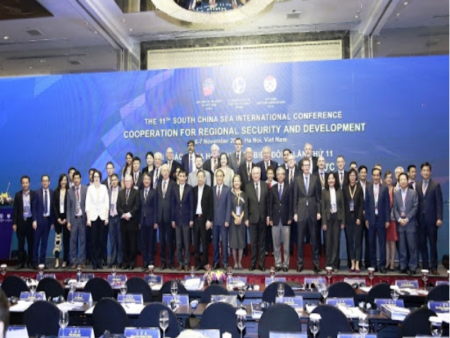Maritime security is part of the national security. Therefore, ensuring maritime security is of utmost importance to facilitating sustainable marine economic development and defending the national sovereignty over seas and islands. Maritime security includes traditional security and non-traditional security. At present, the situation at sea in general, in the East Sea in particularly witnesses extremely complex developments. In addition to traditional security threats and challenges, there are non-traditional security threats and challenges which directly impact on security, safety, benefits, and peace of coastal countries, including Vietnam. It should be noted that sovereign disputes, violations of territorial waters, piracy, smuggling, trade frauds, climate change, environment pollution, and acts against international practices and law of the sea are posing the risk of instability to the sea, especially the East Sea. Hence, maritime security cooperation between Vietnam and other regional and relevant countries should be fostered to restrict, prevent, and push back the threats to maritime security, safety, and freedom in the East Sea and maintain peace and stability so that fishers could exploit marine natural resources within each country’s territorial waters.
 |
| A conference on maritime security cooperation held in Vietnam (photo: dangcongsan.vn) |
Over the years, our Party and State have attached special importance to encouraging maritime security cooperation via mechanisms for bilateral and multilateral security cooperation. Vietnam has actively proposed ideas and initiatives at regional security forums, accelerated the execution of the Declaration on the Conduct of Parties in the East Sea (DOC), strictly observed international law, particularly the 1982 United Nations Convention on the Law of the Sea, resolutely settled disagreements in the East Sea by peaceful means, proactively encouraged relevant parties and regional countries to work towards and sign agreements on maritime security cooperation. However, to deal with complex developments of the situation in the East Sea, regional coastal countries and Vietnam should place special emphasis on adopting measures for expanding, deepening, and making maritime security cooperation more practical and effectiveness. To that end, it is necessary to focus on achieving a consensus among countries on today’s non-traditional security challenges, proactively providing and sharing information about maritime security, raising member states’ responsibility when one member’s national security and sovereignty are threatened, accelerating the negotiation process, completing and quickly putting the Code of Conduct between ASEAN and China in the East Sea into practice. Moreover, it is essential to reach an agreement on method of handling maritime security situations, particularly disputes over fishing grounds and violations of territorial waters. Due regard should be paid to enhancing joint patrols at sea, maintaining hot lines, and organising joint search and rescue exercises and smuggling and piracy combat drills.
To provide assistance for maritime security cooperation effectively, we need to develop our maritime security-related potential, improve our capability in legal struggle, modernise and make our maritime law enforcement forces, such as the Coast Guard, the Navy, and the Fisheries Resources Surveillance strong comprehensively and capable of playing the core role in ensuring maritime security, while frequently consolidating the postures of all-people national defence and people’s security at sea.
Well implementing the above-mentioned measures will greatly contribute to maintaining political security, order, and safety in the East Sea and creating a peaceful, stable environment for regional countries and Vietnam to develop and thrive.
Nguyen Duc Phu